University Leadership Styles: A Comparative Analysis Report
VerifiedAdded on 2023/01/12
|8
|2049
|62
Report
AI Summary
This report analyzes four articles exploring diverse leadership styles. The first article examines ethical leadership, its outcomes, and moderators, emphasizing the importance of ethics and its relationship with transformational leadership. The second article delves into relational leadership, advocating for a socio-material approach in management education. The third article investigates the logic of absurdity in leadership, exploring how leaders make irrational decisions. The final article discusses the neuro-ethics of leadership development, raising concerns about the use of neuroscientific feedback. The report highlights the complexities of leadership, including ethical considerations, relational dynamics, decision-making processes, and the ethical implications of using neuroscientific data for leadership development.

Running head: Leadership
Leadership
Name of the Student
Name of the University
Authors Note
Leadership
Name of the Student
Name of the University
Authors Note
Paraphrase This Document
Need a fresh take? Get an instant paraphrase of this document with our AI Paraphraser
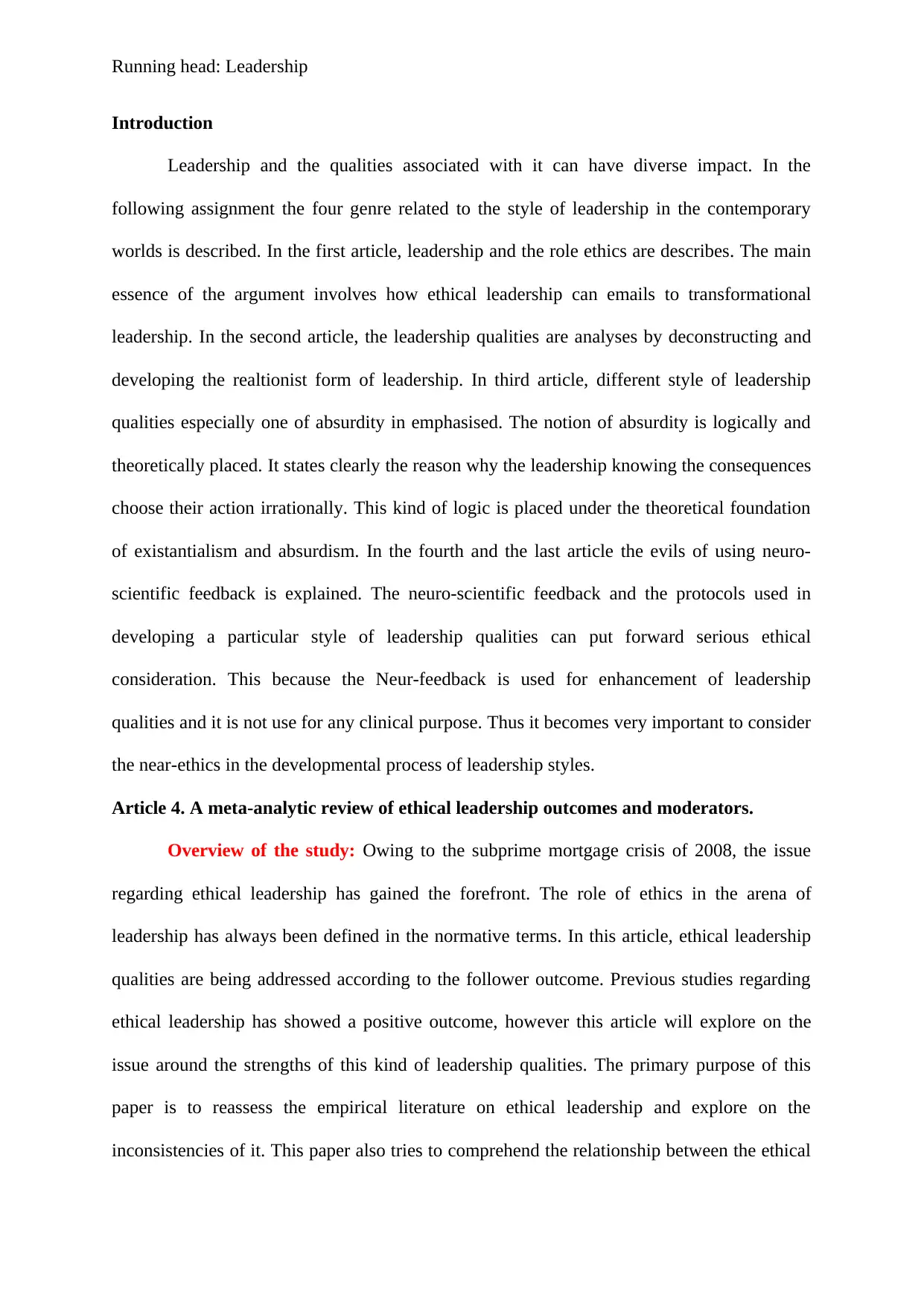
Running head: Leadership
Introduction
Leadership and the qualities associated with it can have diverse impact. In the
following assignment the four genre related to the style of leadership in the contemporary
worlds is described. In the first article, leadership and the role ethics are describes. The main
essence of the argument involves how ethical leadership can emails to transformational
leadership. In the second article, the leadership qualities are analyses by deconstructing and
developing the realtionist form of leadership. In third article, different style of leadership
qualities especially one of absurdity in emphasised. The notion of absurdity is logically and
theoretically placed. It states clearly the reason why the leadership knowing the consequences
choose their action irrationally. This kind of logic is placed under the theoretical foundation
of existantialism and absurdism. In the fourth and the last article the evils of using neuro-
scientific feedback is explained. The neuro-scientific feedback and the protocols used in
developing a particular style of leadership qualities can put forward serious ethical
consideration. This because the Neur-feedback is used for enhancement of leadership
qualities and it is not use for any clinical purpose. Thus it becomes very important to consider
the near-ethics in the developmental process of leadership styles.
Article 4. A meta-analytic review of ethical leadership outcomes and moderators.
Overview of the study: Owing to the subprime mortgage crisis of 2008, the issue
regarding ethical leadership has gained the forefront. The role of ethics in the arena of
leadership has always been defined in the normative terms. In this article, ethical leadership
qualities are being addressed according to the follower outcome. Previous studies regarding
ethical leadership has showed a positive outcome, however this article will explore on the
issue around the strengths of this kind of leadership qualities. The primary purpose of this
paper is to reassess the empirical literature on ethical leadership and explore on the
inconsistencies of it. This paper also tries to comprehend the relationship between the ethical
Introduction
Leadership and the qualities associated with it can have diverse impact. In the
following assignment the four genre related to the style of leadership in the contemporary
worlds is described. In the first article, leadership and the role ethics are describes. The main
essence of the argument involves how ethical leadership can emails to transformational
leadership. In the second article, the leadership qualities are analyses by deconstructing and
developing the realtionist form of leadership. In third article, different style of leadership
qualities especially one of absurdity in emphasised. The notion of absurdity is logically and
theoretically placed. It states clearly the reason why the leadership knowing the consequences
choose their action irrationally. This kind of logic is placed under the theoretical foundation
of existantialism and absurdism. In the fourth and the last article the evils of using neuro-
scientific feedback is explained. The neuro-scientific feedback and the protocols used in
developing a particular style of leadership qualities can put forward serious ethical
consideration. This because the Neur-feedback is used for enhancement of leadership
qualities and it is not use for any clinical purpose. Thus it becomes very important to consider
the near-ethics in the developmental process of leadership styles.
Article 4. A meta-analytic review of ethical leadership outcomes and moderators.
Overview of the study: Owing to the subprime mortgage crisis of 2008, the issue
regarding ethical leadership has gained the forefront. The role of ethics in the arena of
leadership has always been defined in the normative terms. In this article, ethical leadership
qualities are being addressed according to the follower outcome. Previous studies regarding
ethical leadership has showed a positive outcome, however this article will explore on the
issue around the strengths of this kind of leadership qualities. The primary purpose of this
paper is to reassess the empirical literature on ethical leadership and explore on the
inconsistencies of it. This paper also tries to comprehend the relationship between the ethical
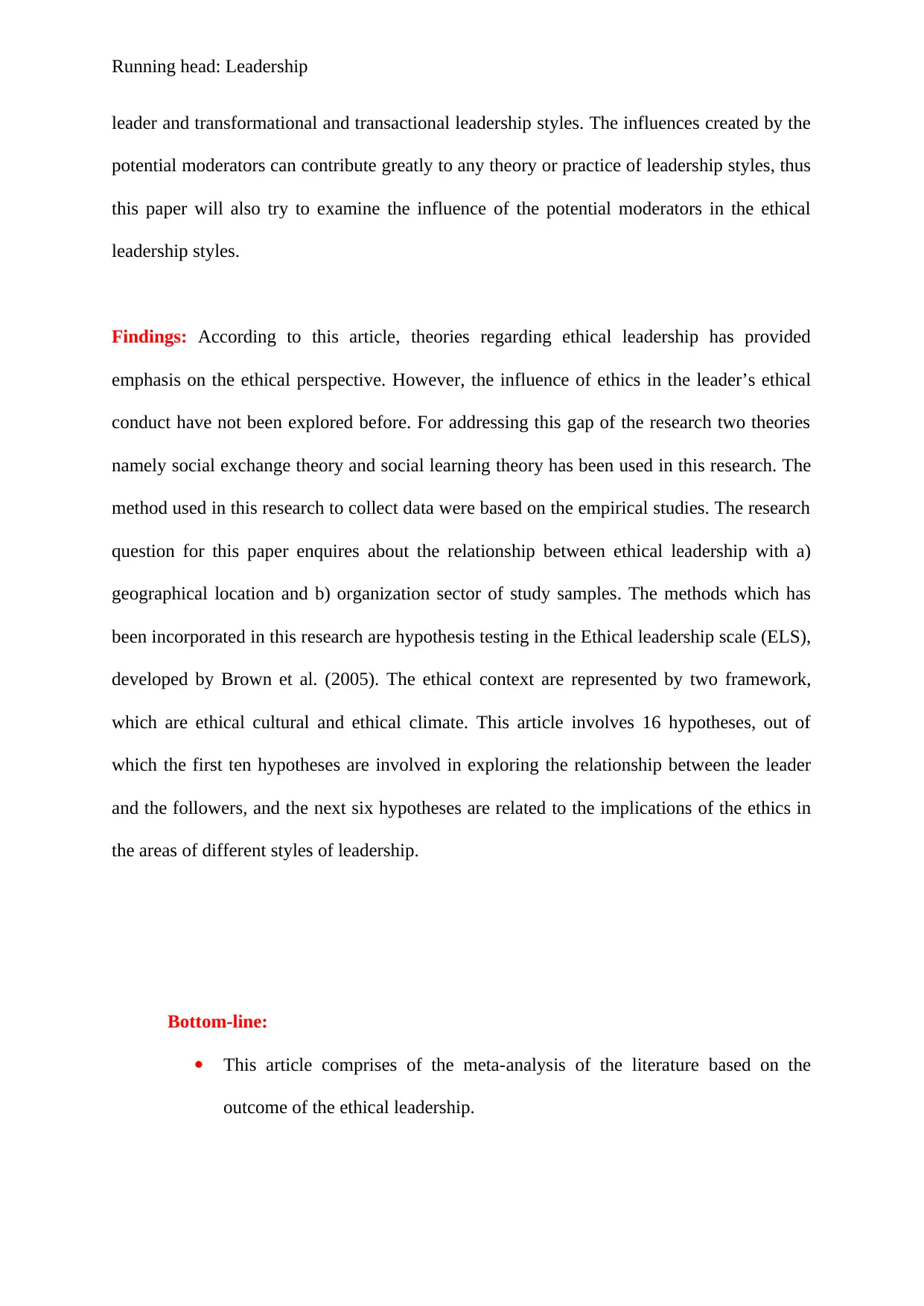
Running head: Leadership
leader and transformational and transactional leadership styles. The influences created by the
potential moderators can contribute greatly to any theory or practice of leadership styles, thus
this paper will also try to examine the influence of the potential moderators in the ethical
leadership styles.
Findings: According to this article, theories regarding ethical leadership has provided
emphasis on the ethical perspective. However, the influence of ethics in the leader’s ethical
conduct have not been explored before. For addressing this gap of the research two theories
namely social exchange theory and social learning theory has been used in this research. The
method used in this research to collect data were based on the empirical studies. The research
question for this paper enquires about the relationship between ethical leadership with a)
geographical location and b) organization sector of study samples. The methods which has
been incorporated in this research are hypothesis testing in the Ethical leadership scale (ELS),
developed by Brown et al. (2005). The ethical context are represented by two framework,
which are ethical cultural and ethical climate. This article involves 16 hypotheses, out of
which the first ten hypotheses are involved in exploring the relationship between the leader
and the followers, and the next six hypotheses are related to the implications of the ethics in
the areas of different styles of leadership.
Bottom-line:
This article comprises of the meta-analysis of the literature based on the
outcome of the ethical leadership.
leader and transformational and transactional leadership styles. The influences created by the
potential moderators can contribute greatly to any theory or practice of leadership styles, thus
this paper will also try to examine the influence of the potential moderators in the ethical
leadership styles.
Findings: According to this article, theories regarding ethical leadership has provided
emphasis on the ethical perspective. However, the influence of ethics in the leader’s ethical
conduct have not been explored before. For addressing this gap of the research two theories
namely social exchange theory and social learning theory has been used in this research. The
method used in this research to collect data were based on the empirical studies. The research
question for this paper enquires about the relationship between ethical leadership with a)
geographical location and b) organization sector of study samples. The methods which has
been incorporated in this research are hypothesis testing in the Ethical leadership scale (ELS),
developed by Brown et al. (2005). The ethical context are represented by two framework,
which are ethical cultural and ethical climate. This article involves 16 hypotheses, out of
which the first ten hypotheses are involved in exploring the relationship between the leader
and the followers, and the next six hypotheses are related to the implications of the ethics in
the areas of different styles of leadership.
Bottom-line:
This article comprises of the meta-analysis of the literature based on the
outcome of the ethical leadership.
⊘ This is a preview!⊘
Do you want full access?
Subscribe today to unlock all pages.

Trusted by 1+ million students worldwide
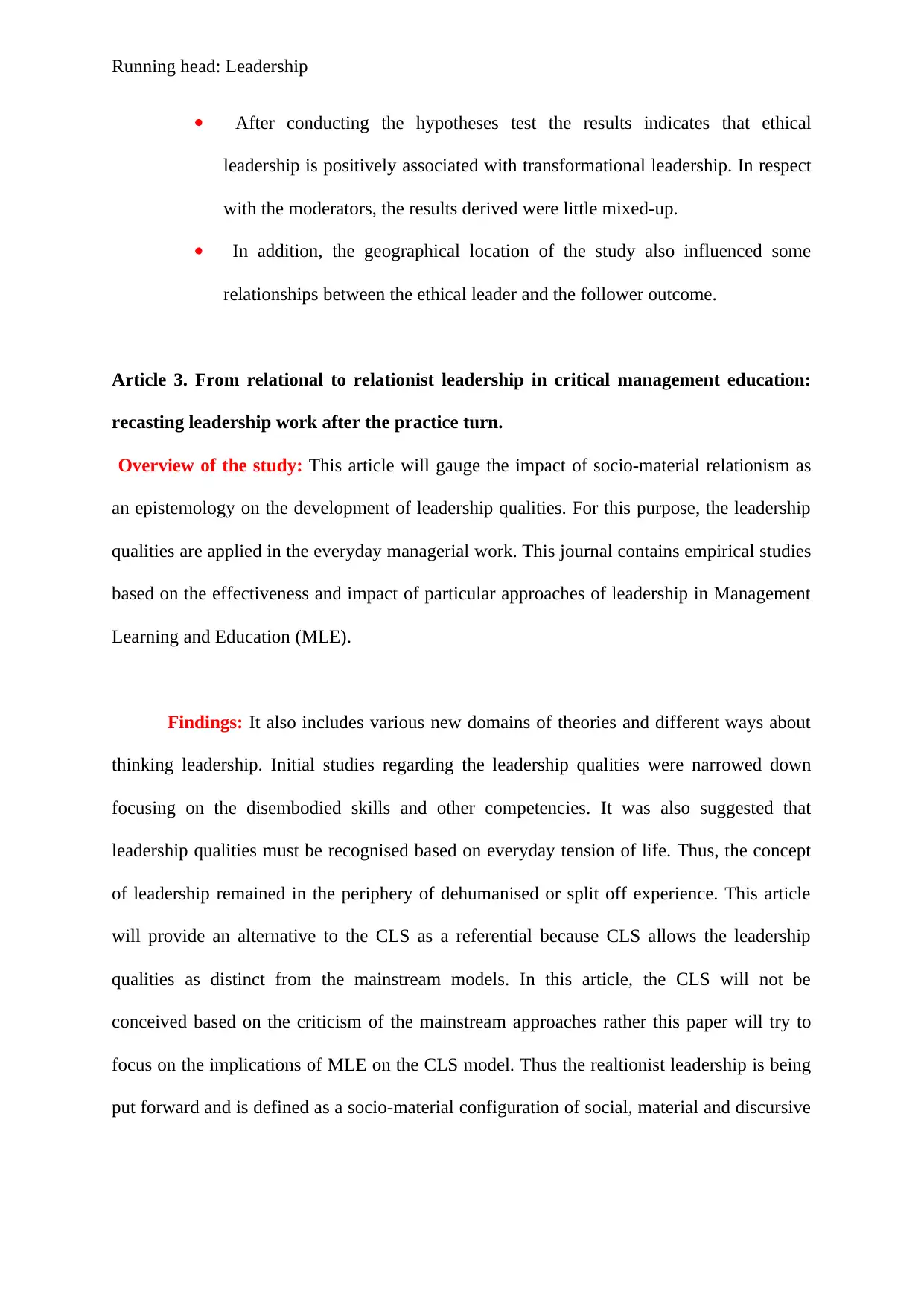
Running head: Leadership
After conducting the hypotheses test the results indicates that ethical
leadership is positively associated with transformational leadership. In respect
with the moderators, the results derived were little mixed-up.
In addition, the geographical location of the study also influenced some
relationships between the ethical leader and the follower outcome.
Article 3. From relational to relationist leadership in critical management education:
recasting leadership work after the practice turn.
Overview of the study: This article will gauge the impact of socio-material relationism as
an epistemology on the development of leadership qualities. For this purpose, the leadership
qualities are applied in the everyday managerial work. This journal contains empirical studies
based on the effectiveness and impact of particular approaches of leadership in Management
Learning and Education (MLE).
Findings: It also includes various new domains of theories and different ways about
thinking leadership. Initial studies regarding the leadership qualities were narrowed down
focusing on the disembodied skills and other competencies. It was also suggested that
leadership qualities must be recognised based on everyday tension of life. Thus, the concept
of leadership remained in the periphery of dehumanised or split off experience. This article
will provide an alternative to the CLS as a referential because CLS allows the leadership
qualities as distinct from the mainstream models. In this article, the CLS will not be
conceived based on the criticism of the mainstream approaches rather this paper will try to
focus on the implications of MLE on the CLS model. Thus the realtionist leadership is being
put forward and is defined as a socio-material configuration of social, material and discursive
After conducting the hypotheses test the results indicates that ethical
leadership is positively associated with transformational leadership. In respect
with the moderators, the results derived were little mixed-up.
In addition, the geographical location of the study also influenced some
relationships between the ethical leader and the follower outcome.
Article 3. From relational to relationist leadership in critical management education:
recasting leadership work after the practice turn.
Overview of the study: This article will gauge the impact of socio-material relationism as
an epistemology on the development of leadership qualities. For this purpose, the leadership
qualities are applied in the everyday managerial work. This journal contains empirical studies
based on the effectiveness and impact of particular approaches of leadership in Management
Learning and Education (MLE).
Findings: It also includes various new domains of theories and different ways about
thinking leadership. Initial studies regarding the leadership qualities were narrowed down
focusing on the disembodied skills and other competencies. It was also suggested that
leadership qualities must be recognised based on everyday tension of life. Thus, the concept
of leadership remained in the periphery of dehumanised or split off experience. This article
will provide an alternative to the CLS as a referential because CLS allows the leadership
qualities as distinct from the mainstream models. In this article, the CLS will not be
conceived based on the criticism of the mainstream approaches rather this paper will try to
focus on the implications of MLE on the CLS model. Thus the realtionist leadership is being
put forward and is defined as a socio-material configuration of social, material and discursive
Paraphrase This Document
Need a fresh take? Get an instant paraphrase of this document with our AI Paraphraser
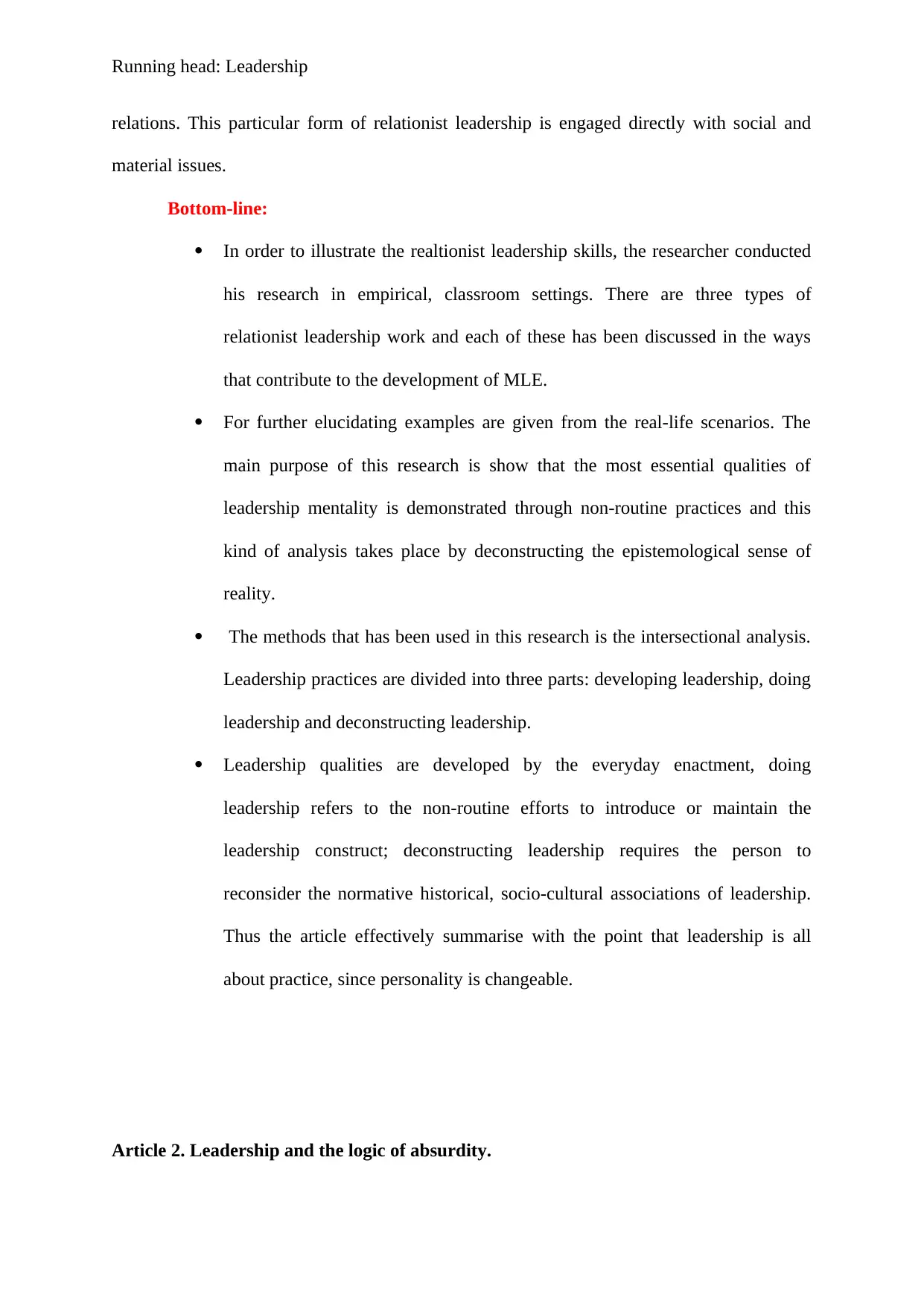
Running head: Leadership
relations. This particular form of relationist leadership is engaged directly with social and
material issues.
Bottom-line:
In order to illustrate the realtionist leadership skills, the researcher conducted
his research in empirical, classroom settings. There are three types of
relationist leadership work and each of these has been discussed in the ways
that contribute to the development of MLE.
For further elucidating examples are given from the real-life scenarios. The
main purpose of this research is show that the most essential qualities of
leadership mentality is demonstrated through non-routine practices and this
kind of analysis takes place by deconstructing the epistemological sense of
reality.
The methods that has been used in this research is the intersectional analysis.
Leadership practices are divided into three parts: developing leadership, doing
leadership and deconstructing leadership.
Leadership qualities are developed by the everyday enactment, doing
leadership refers to the non-routine efforts to introduce or maintain the
leadership construct; deconstructing leadership requires the person to
reconsider the normative historical, socio-cultural associations of leadership.
Thus the article effectively summarise with the point that leadership is all
about practice, since personality is changeable.
Article 2. Leadership and the logic of absurdity.
relations. This particular form of relationist leadership is engaged directly with social and
material issues.
Bottom-line:
In order to illustrate the realtionist leadership skills, the researcher conducted
his research in empirical, classroom settings. There are three types of
relationist leadership work and each of these has been discussed in the ways
that contribute to the development of MLE.
For further elucidating examples are given from the real-life scenarios. The
main purpose of this research is show that the most essential qualities of
leadership mentality is demonstrated through non-routine practices and this
kind of analysis takes place by deconstructing the epistemological sense of
reality.
The methods that has been used in this research is the intersectional analysis.
Leadership practices are divided into three parts: developing leadership, doing
leadership and deconstructing leadership.
Leadership qualities are developed by the everyday enactment, doing
leadership refers to the non-routine efforts to introduce or maintain the
leadership construct; deconstructing leadership requires the person to
reconsider the normative historical, socio-cultural associations of leadership.
Thus the article effectively summarise with the point that leadership is all
about practice, since personality is changeable.
Article 2. Leadership and the logic of absurdity.
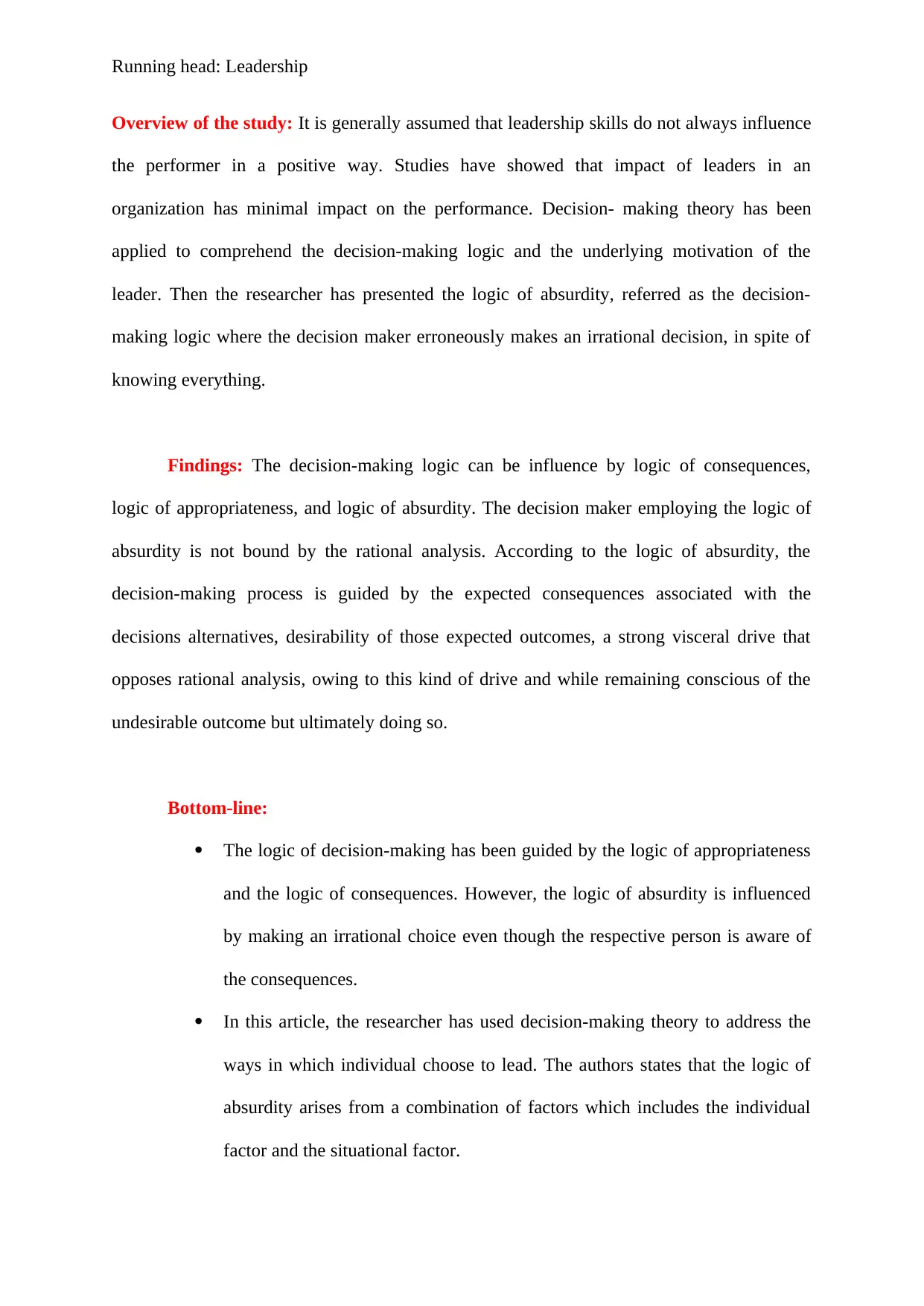
Running head: Leadership
Overview of the study: It is generally assumed that leadership skills do not always influence
the performer in a positive way. Studies have showed that impact of leaders in an
organization has minimal impact on the performance. Decision- making theory has been
applied to comprehend the decision-making logic and the underlying motivation of the
leader. Then the researcher has presented the logic of absurdity, referred as the decision-
making logic where the decision maker erroneously makes an irrational decision, in spite of
knowing everything.
Findings: The decision-making logic can be influence by logic of consequences,
logic of appropriateness, and logic of absurdity. The decision maker employing the logic of
absurdity is not bound by the rational analysis. According to the logic of absurdity, the
decision-making process is guided by the expected consequences associated with the
decisions alternatives, desirability of those expected outcomes, a strong visceral drive that
opposes rational analysis, owing to this kind of drive and while remaining conscious of the
undesirable outcome but ultimately doing so.
Bottom-line:
The logic of decision-making has been guided by the logic of appropriateness
and the logic of consequences. However, the logic of absurdity is influenced
by making an irrational choice even though the respective person is aware of
the consequences.
In this article, the researcher has used decision-making theory to address the
ways in which individual choose to lead. The authors states that the logic of
absurdity arises from a combination of factors which includes the individual
factor and the situational factor.
Overview of the study: It is generally assumed that leadership skills do not always influence
the performer in a positive way. Studies have showed that impact of leaders in an
organization has minimal impact on the performance. Decision- making theory has been
applied to comprehend the decision-making logic and the underlying motivation of the
leader. Then the researcher has presented the logic of absurdity, referred as the decision-
making logic where the decision maker erroneously makes an irrational decision, in spite of
knowing everything.
Findings: The decision-making logic can be influence by logic of consequences,
logic of appropriateness, and logic of absurdity. The decision maker employing the logic of
absurdity is not bound by the rational analysis. According to the logic of absurdity, the
decision-making process is guided by the expected consequences associated with the
decisions alternatives, desirability of those expected outcomes, a strong visceral drive that
opposes rational analysis, owing to this kind of drive and while remaining conscious of the
undesirable outcome but ultimately doing so.
Bottom-line:
The logic of decision-making has been guided by the logic of appropriateness
and the logic of consequences. However, the logic of absurdity is influenced
by making an irrational choice even though the respective person is aware of
the consequences.
In this article, the researcher has used decision-making theory to address the
ways in which individual choose to lead. The authors states that the logic of
absurdity arises from a combination of factors which includes the individual
factor and the situational factor.
⊘ This is a preview!⊘
Do you want full access?
Subscribe today to unlock all pages.

Trusted by 1+ million students worldwide
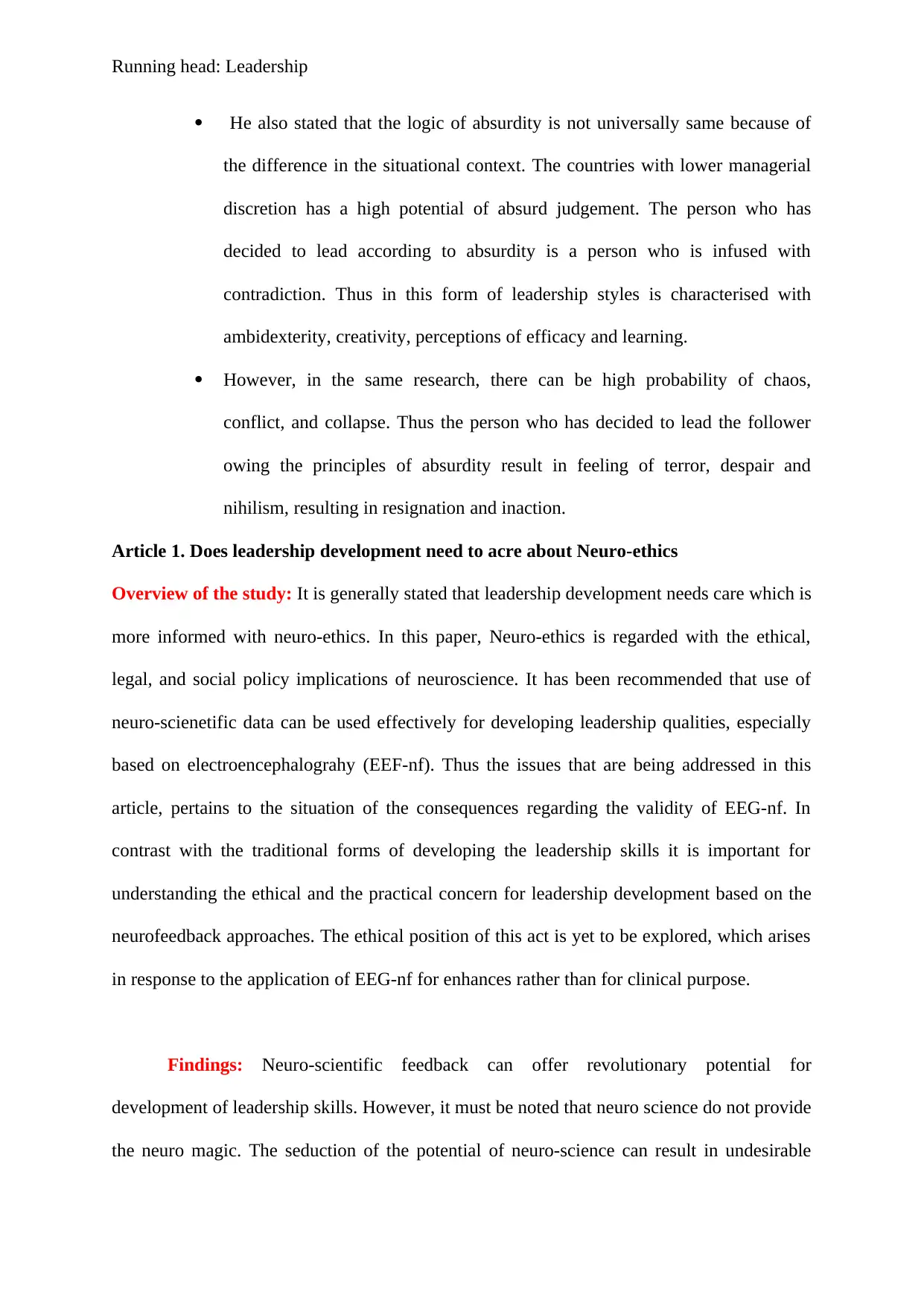
Running head: Leadership
He also stated that the logic of absurdity is not universally same because of
the difference in the situational context. The countries with lower managerial
discretion has a high potential of absurd judgement. The person who has
decided to lead according to absurdity is a person who is infused with
contradiction. Thus in this form of leadership styles is characterised with
ambidexterity, creativity, perceptions of efficacy and learning.
However, in the same research, there can be high probability of chaos,
conflict, and collapse. Thus the person who has decided to lead the follower
owing the principles of absurdity result in feeling of terror, despair and
nihilism, resulting in resignation and inaction.
Article 1. Does leadership development need to acre about Neuro-ethics
Overview of the study: It is generally stated that leadership development needs care which is
more informed with neuro-ethics. In this paper, Neuro-ethics is regarded with the ethical,
legal, and social policy implications of neuroscience. It has been recommended that use of
neuro-scienetific data can be used effectively for developing leadership qualities, especially
based on electroencephalograhy (EEF-nf). Thus the issues that are being addressed in this
article, pertains to the situation of the consequences regarding the validity of EEG-nf. In
contrast with the traditional forms of developing the leadership skills it is important for
understanding the ethical and the practical concern for leadership development based on the
neurofeedback approaches. The ethical position of this act is yet to be explored, which arises
in response to the application of EEG-nf for enhances rather than for clinical purpose.
Findings: Neuro-scientific feedback can offer revolutionary potential for
development of leadership skills. However, it must be noted that neuro science do not provide
the neuro magic. The seduction of the potential of neuro-science can result in undesirable
He also stated that the logic of absurdity is not universally same because of
the difference in the situational context. The countries with lower managerial
discretion has a high potential of absurd judgement. The person who has
decided to lead according to absurdity is a person who is infused with
contradiction. Thus in this form of leadership styles is characterised with
ambidexterity, creativity, perceptions of efficacy and learning.
However, in the same research, there can be high probability of chaos,
conflict, and collapse. Thus the person who has decided to lead the follower
owing the principles of absurdity result in feeling of terror, despair and
nihilism, resulting in resignation and inaction.
Article 1. Does leadership development need to acre about Neuro-ethics
Overview of the study: It is generally stated that leadership development needs care which is
more informed with neuro-ethics. In this paper, Neuro-ethics is regarded with the ethical,
legal, and social policy implications of neuroscience. It has been recommended that use of
neuro-scienetific data can be used effectively for developing leadership qualities, especially
based on electroencephalograhy (EEF-nf). Thus the issues that are being addressed in this
article, pertains to the situation of the consequences regarding the validity of EEG-nf. In
contrast with the traditional forms of developing the leadership skills it is important for
understanding the ethical and the practical concern for leadership development based on the
neurofeedback approaches. The ethical position of this act is yet to be explored, which arises
in response to the application of EEG-nf for enhances rather than for clinical purpose.
Findings: Neuro-scientific feedback can offer revolutionary potential for
development of leadership skills. However, it must be noted that neuro science do not provide
the neuro magic. The seduction of the potential of neuro-science can result in undesirable
Paraphrase This Document
Need a fresh take? Get an instant paraphrase of this document with our AI Paraphraser
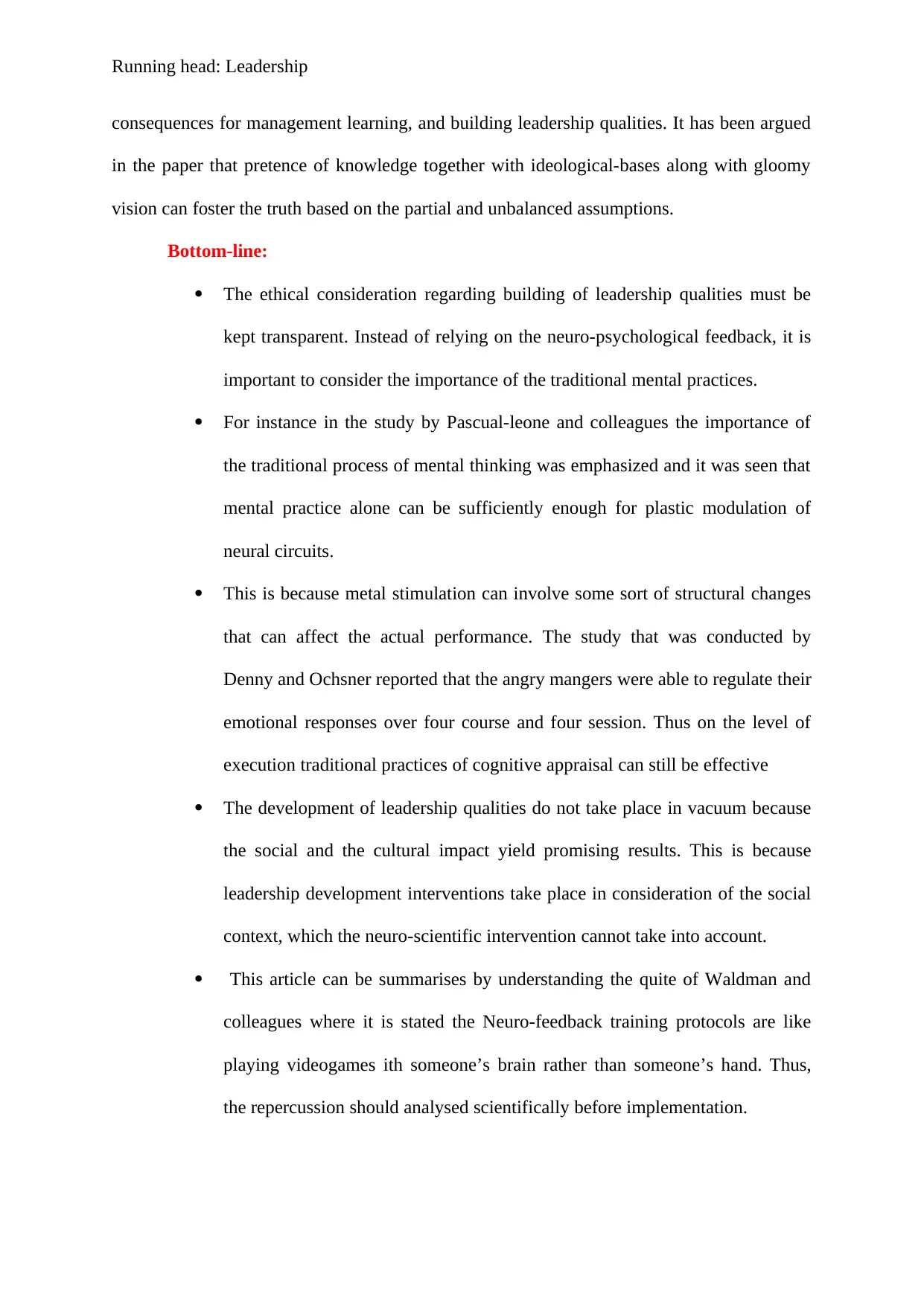
Running head: Leadership
consequences for management learning, and building leadership qualities. It has been argued
in the paper that pretence of knowledge together with ideological-bases along with gloomy
vision can foster the truth based on the partial and unbalanced assumptions.
Bottom-line:
The ethical consideration regarding building of leadership qualities must be
kept transparent. Instead of relying on the neuro-psychological feedback, it is
important to consider the importance of the traditional mental practices.
For instance in the study by Pascual-leone and colleagues the importance of
the traditional process of mental thinking was emphasized and it was seen that
mental practice alone can be sufficiently enough for plastic modulation of
neural circuits.
This is because metal stimulation can involve some sort of structural changes
that can affect the actual performance. The study that was conducted by
Denny and Ochsner reported that the angry mangers were able to regulate their
emotional responses over four course and four session. Thus on the level of
execution traditional practices of cognitive appraisal can still be effective
The development of leadership qualities do not take place in vacuum because
the social and the cultural impact yield promising results. This is because
leadership development interventions take place in consideration of the social
context, which the neuro-scientific intervention cannot take into account.
This article can be summarises by understanding the quite of Waldman and
colleagues where it is stated the Neuro-feedback training protocols are like
playing videogames ith someone’s brain rather than someone’s hand. Thus,
the repercussion should analysed scientifically before implementation.
consequences for management learning, and building leadership qualities. It has been argued
in the paper that pretence of knowledge together with ideological-bases along with gloomy
vision can foster the truth based on the partial and unbalanced assumptions.
Bottom-line:
The ethical consideration regarding building of leadership qualities must be
kept transparent. Instead of relying on the neuro-psychological feedback, it is
important to consider the importance of the traditional mental practices.
For instance in the study by Pascual-leone and colleagues the importance of
the traditional process of mental thinking was emphasized and it was seen that
mental practice alone can be sufficiently enough for plastic modulation of
neural circuits.
This is because metal stimulation can involve some sort of structural changes
that can affect the actual performance. The study that was conducted by
Denny and Ochsner reported that the angry mangers were able to regulate their
emotional responses over four course and four session. Thus on the level of
execution traditional practices of cognitive appraisal can still be effective
The development of leadership qualities do not take place in vacuum because
the social and the cultural impact yield promising results. This is because
leadership development interventions take place in consideration of the social
context, which the neuro-scientific intervention cannot take into account.
This article can be summarises by understanding the quite of Waldman and
colleagues where it is stated the Neuro-feedback training protocols are like
playing videogames ith someone’s brain rather than someone’s hand. Thus,
the repercussion should analysed scientifically before implementation.
1 out of 8
Related Documents
Your All-in-One AI-Powered Toolkit for Academic Success.
+13062052269
info@desklib.com
Available 24*7 on WhatsApp / Email
![[object Object]](/_next/static/media/star-bottom.7253800d.svg)
Unlock your academic potential
Copyright © 2020–2026 A2Z Services. All Rights Reserved. Developed and managed by ZUCOL.





